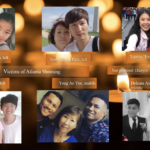New Haven residents create AAPI coalition in wake of hate crimes
Members of the AAPI community are forming a new coalition, called aapiNHV, to increase the coordination of efforts to combat anti-Asian racism and violence.

James Larson, Senior Photographer
New Haven residents are joining forces to create an Asian American and Pacific Islander coalition in response to the rise of AAPI-targeted hate crimes during the pandemic.
At a March 25 press conference in response to the March 16 Atlanta shootings that killed eight people, including six Asian women, New Haven Mayor Justin Elicker and members of New Haven’s Asian American community announced the creation of a brand-new coalition to combat anti-Asian sentiment. The event was held outside of Laotian restaurant Pho Ketkeo, which was vandalized a year ago, according to the New Haven Independent. Just three months later, the restaurant’s owner was beaten up and mugged in what appears to be a racially-charged attack.
The new coalition, organizers say, will work to combat this violence and amplify the voices of the AAPI community.
“We honor and stand on the shoulders of the local activists and community leaders, many represented here have worked tirelessly to build a strong and diverse community that stands against hate [and] injustice,” Christine Kim ’99 said at the press conference. “We hope to partner with and learn from you as we prove ourselves as authentic allies.”
Among the event’s other speakers were Connecticut Attorney General William Tong, local AAPI business owners and a slate of Black, Latino, Jewish, Muslim and white faith leaders.
The new coalition, now named aapiNHV, will be led by Kim, Annie Lin ’09 and Jennifer Heikkila Díaz ’00, all of whom have experience in Asian American activism. The three women, who all have young children, are dedicating weekly time to create a space for open dialogues among AAPI community members as the young organization finds its footing. In an interview with the News, the New Haven organizers laid out details for the new coalition, which has led meetings every Monday through a Facebook group.
In its nascent stages, the group is mainly a space for residents to share their experiences and reflect on their experiences as Asian Americans, Kim told the News. The community must first connect with each other and build trust, she said, emphasizing that the community is not monolithic and maintains differences in “generations of immigration, ethnicities and socio-economic educational levels.”
Lin, who sits on New Haven’s Cultural Equity Task Force, said aapiNHV has considered working education initiatives and art projects geared to increasing awareness and representation of the Asian American experience. She stressed that the coalition does not currently have a set docket or agenda each week and is more focused on connecting those of AAPI heritage in the Elm City in addition to determining where the organization can be supportive.
“We want this to happen organically,” Lin said. “We want to really understand what the New Haven AAPI collective looks like and how we can take action together with our allies.”
aapiNHV’s organizers also noted that listening to the members of the New Haven community beyond Yale’s walls is a particular priority.
According to Kim, who first moved to New Haven in the 1990s, there has not previously been a formal structure to coordinate citywide Asian American activism. The coalition, she hopes, will be a step in that direction. However, Lin added that AAPI community members in the city have been carrying out important individual work in designing anti-racism curriculum for students, holding virtual events and supporting small AAPI-owned businesses. The Atlanta shootings are a “call to action” to foster a network between existing efforts, she said.
The new coalition appears to have abundant support from other communities as well as local officials. Kim praised Elicker and Tong for taking an important step in reaching out to community members about forming a coalition. At the March 15 press conference, both officials committed support for aapiNHV’s future work.
“Just the fact that we have so many people here today is a demonstration of New Haven’s values,” Elicker said. “Today we stand together as a community to underscore, in no uncertain terms, that hate and violence and disciminrtaion against Asian Americans and Pacific Islanders have no place in this city.”
Kim told the News that the AAPI community members did not purposefully seek to connect among themselves before recently. Rather, she said, being “forced into a census box or into a category of discrimination,” has pushed Asian Americans and Pacific Islanders of varying backgrounds to come together under the AAPI label.
Evidence of structural violence, Kim said, persuaded her to join the coalition which would not have naturally occurred in the first place.
“We’re concerned and afraid for ourselves and our families,” Kim said.
Díaz highlighted several education-centered pieces of legislation that the coalition is advocating to pass. One bill, which is currently being considered by the state legislature’s education committee, would institute an Asian American Studies curriculum for public schools throughout the state. Díaz, who sits on an advisory committee of the state resource education center that created the state’s Latino Studies course program for state high school students, said she is optimistic Asian Americans can lobby for the creation of a similar ethnic studies program.
May is Asian American and Pacific Islander Heritage Month.
Correction, May 7: An earlier version of this story referred to Heikkila Díaz as “Heikkela Diaz” and wrongly stated that she worked for the state resource education center. In fact, she serves on the advisory committee for the Black/Latinx Elective Course. The story has been updated.









